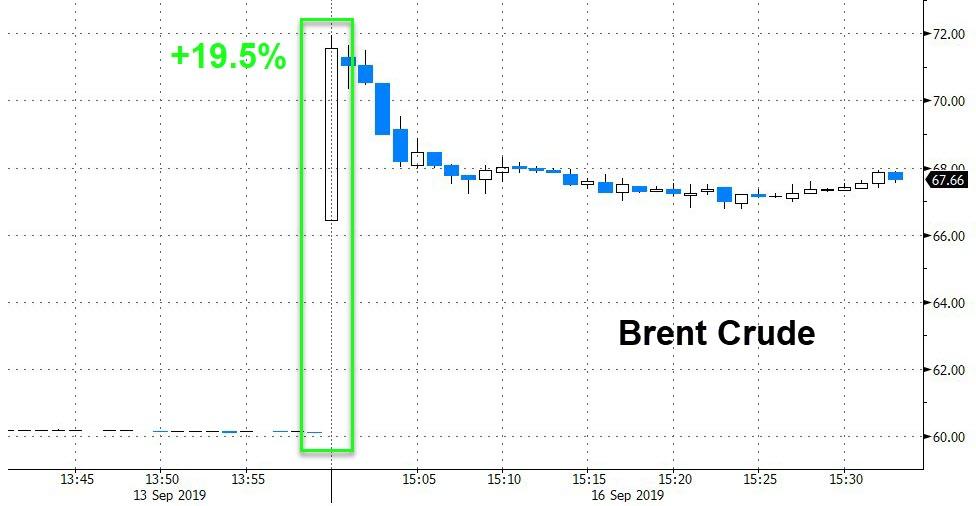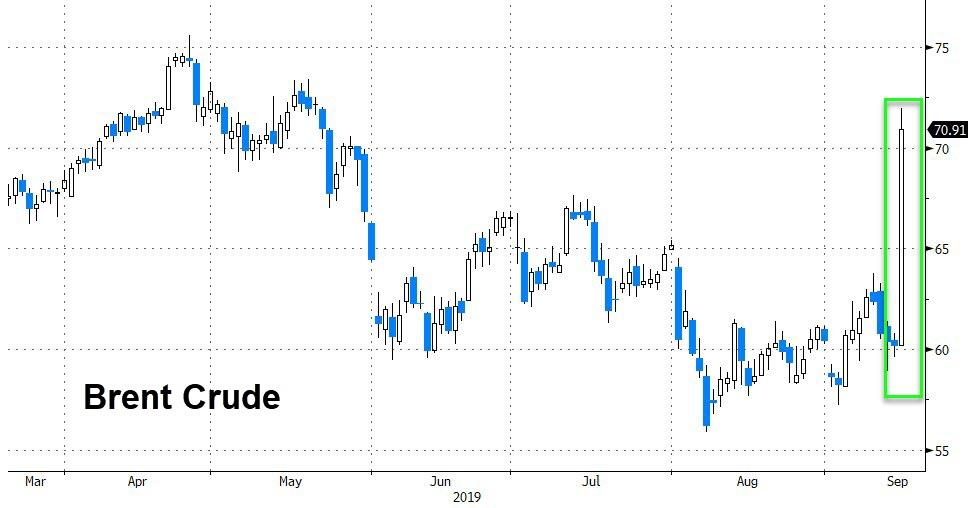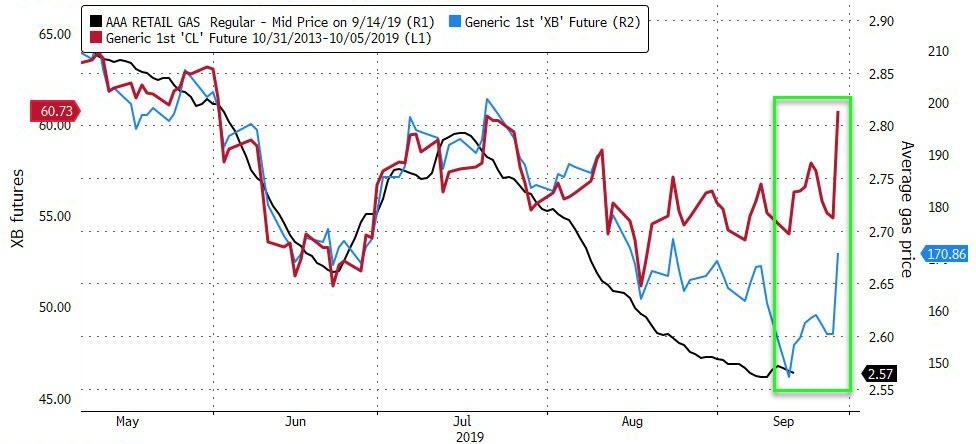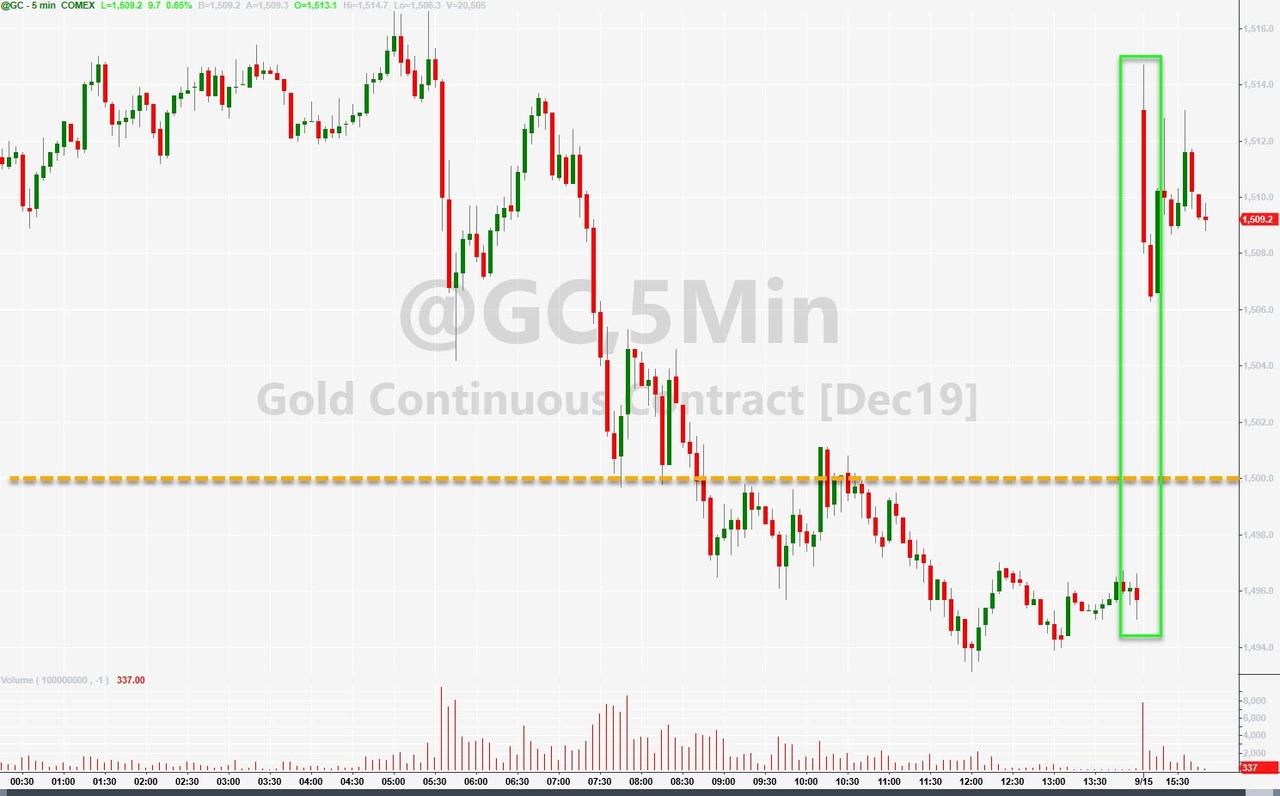This is hot through the wires
Oil Explodes 20%
Higher, Biggest Jump
On Record
Oil Explodes 20%
Higher, Biggest Jump
On Record
Brent crude surged the most on record after a drone strike on a Saudi Arabian oil facility removed about 5% of global supplies.
The benchmark oil futures jumped as much as $11.73 a barrel to $71.95 as the market opened Monday in Asia, the biggest jump in dollar-terms since futures started trading in 1988. State energy producer Saudi Aramco lost about 5.7 million barrels per day of output on Saturday after 10 unmanned aerial vehicles struck the world’s biggest crude-processing facility in Abqaiq and the kingdom’s second-biggest oil field in Khurais.
https://www.bloomberg.com/news/articles/2019-09-15/oil-prices-jump-19-after-attack-cuts-saudi-arabian-supplies
Trump
authorized release of oil from Strategic Petroleum Reserve if needed
to keep markets supplied
RT,
15
September, 2019
US
President Donald Trump has said he green-lighted the release of oil
from the US strategic reserves and ordered to streamline pipelines’
approvals to keep the oil market “well-supplied” in wake of the
attacks on Saudi Aramco.
The
drone strikes on Saudi Arabia’s largest Abqaiq oil processing plant
and another oil facility have cut the state-run oil giant’s daily
production in half, sending Saudi stocks into a nosedive and sparking
fears that oil prices can rise to triple-digits.
In
a series of tweets on Sunday, Trump said that the US would draw from
its oil reserves “if
needed, in a to-be-determined amount sufficient to keep the markets
well supplied,” adding
that he “also
informed all appropriate agencies to expedite approvals of the oil
pipelines currently in the permitting process in Texas and various
other States.”
Based on the attack on Saudi Arabia, which may have an impact on oil prices, I have authorized the release of oil from the Strategic Petroleum Reserve, if needed, in a to-be-determined amount....
8,829 people are talking about this
....sufficient to keep the markets well-supplied. I have also informed all appropriate agencies to expedite approvals of the oil pipelines currently in the permitting process in Texas and various other States.
In
a run-up to the Trump’s announcement, the US Energy Secretary Rick
Perry confirmed that Washington “stands ready” to deploy its own
reserves to “offset any disruption to oil markets as a result of
this act of aggression.”
The
drone attacks that triggered major blazes at two Saudi oil refineries
in the early hours of Saturday were claimed by Houthi rebels, that
previously admitted to staging attacks on the Saudi territory,
including on the kingdom’s airports, in retaliation to the
Saudi-led coalition bombing camping in Yemen on behalf of the ousted
President Abdrabbuh Mansur Hadi, that has led to mass civilian
casualties.
Washington,
however, pinned the blame squarely on Tehran, alleging that the
attack was too sophisticated to be carried out by the rebels, with a
senior US official telling Reuters that US intelligence pinpointed
the launch area in the direction of Iraq and Iran.
Tehran
has rebuffed the allegations, describing them as "maximum lies"
and saying it stands ready to defend itself in case of a war.
The
US Strategic Petroleum Reserve is the world’s largest cache of
emergency crude, located underground in Louisiana and Texas, and
totaling some 630 million barrel.
Oil
Explodes 20% Higher, Biggest Jump On Record
15
September, 2019
With
traders in a state of near-frenzy, with a subset of fintwit
scrambling (and failing) to calculate what the limit move in oil
would be (hint: there is none for Brent), moments ago brent reopened
for trading in the aftermath of Saturday's attack on the "world's
most important oil processing plant", and exploded some 20%
higher, to a high of $71.95 from the Friday $60.22 close, its biggest
jump since futures started trading in 1988.
Source: Bloomberg
Source:
Bloomberg
As
Bloomberg notes, "for oil markets, it’s the single worst
sudden disruption ever, surpassing the loss of Kuwaiti and Iraqi
petroleum supply in August 1990, when Saddam Hussein invaded his
neighbor. It also exceeds the loss of Iranian oil output in 1979
during the Islamic Revolution, according to data from the U.S.
Department of Energy."
Furthermore,
in light of news that the Saudi
outage could last for months,
this could be just the start. As a reminder, according to Morningstar
research director, Sandy Fielden, “Brent could go to $80 tomorrow,
while WTI could go to $75... But that would depend on Aramco’s
48-hour update. The supply problem won’t be clear right away since
the Saudis can still deliver from inventory."
Of
course, should Aramco confirm that the outage - which has taken some
5.7mmb/d in Saudi output after 10 drones struck the world’s biggest
crude-processing facility in Abqaiq and the kingdom’s
second-biggest oil field in Khurais - will last for weeks, expect the
crude juggernaut to continue until the price hits $80, and keeps
moving higher.
Finally,
here is the price summary from Goldman commodity strategist Damien
Courvalin, who earlier today laid out four possible shutdown
scenarios, and the price oil could hit for each:
-
A very short outage – a week for example – would likely drive long-dated prices higher to reflect a growing risk premium, although short of what occurred last fall given a debottlenecked Permian shale basin, a weaker growth outlook and prospects of strong non-OPEC production growth in 2020. Such a price impact could likely be of $3-5/bbl.
-
An outage at current levels of two to six weeks would, in addition to this move in long-dated prices, see a steepening of the Brent forward curve (2-mo vs. 3-year forward) of $2 to $9/bbl respectively. All in, the expected price move would be between $5 and $14/bbl, commensurate to the length of the outage (a six month outage of 1 mb/d would be similar to a six week one at current levels).
-
Should the current level of outage be announced to last for more than six weeks, we expect Brent prices to quickly rally above $75/bbl, a level at which we believe an SPR release would likely be implemented, large enough to balance such a deficit for several months and cap prices at such levels.
-
An extreme net outage of a 4 mb/d for more than three months would likely bring prices above $75/bbl to trigger both large shale supply and demand responses.
What
are the broader implications from this move? According to Ole Hansen,
head of commodities strategy at Saxo Bank A/S in Copenhagen, "the
global economy can ill afford higher oil prices at a time of economic
slowdown." But Peter Boockvar's hot take may be the best one.
I guess central bankers are pretty happy with the Iranians as they might actually get the inflation they've been rooting for.
68 people are talking about this
Yet
while the inflationary impact from this surge will be transitory at
best, it will be interesting to watch the Fed cut rates with stocks
at all time highs, and with gasoline prices set for their biggest
surge in decades.
Source:
Bloomberg
Safe
havens are also bid with gold futures back above $1500.
As
bankers discussed Saudi Aramco’s initial public offering at the
Ritz Carlton hotel in Dubai last week, a drone attack was being
planned to hit the heart of its operations over the weekend. It
caused Saudi Arabia to halve its oil output and may cut the valuation
of Aramco’s milestone deal.
The
giant oil producer has accelerated preparations for a share sale that
could happen as soon as November in Riyadh. Dozens of bankers from
Citigroup Inc. to JPMorgan Chase & Co. met last week to work on
the deal, with analyst presentations initially scheduled for next
week, people familiar with the matter have said.











No comments:
Post a Comment
Note: only a member of this blog may post a comment.